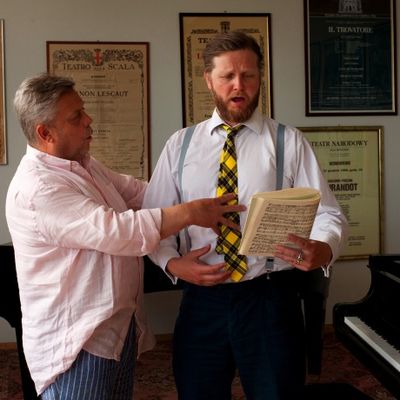
Last Saturday, Ragnar KjartanssonÔÇÖs twelve-hour operatic performance Bliss, at the Abrons auditorium, saw audiences cheering in the aisles, crying in their seats, struck dumb and lifted high by the transforming hallucinatory power of the rococo and the amazing sight of an artist earnestly, even desperately trying to cut through 21st-century irony. ItÔÇÖs a masterpiece. The performance started at noon, when ten Icelandic opera singers took the stage in eighteenth-century folk costume, including Kjartansson himself dressed as a peasant carrying a stuffed dead hare. Then all began to sing the ravishing, almost ecclesiastic five-minute finale of MozartÔÇÖs ÔÇ£The Marriage of Figaro.ÔÇØ This divine refrain consists of only three lines. A philandering count begs his wifeÔÇÖs forgiveness, singing, ÔÇ£Countess, pardon me.ÔÇØ She responds, ÔÇ£I am gentler. And I grant it to you.ÔÇØ Hearing her, everyone fills with joy and sings together, ÔÇ£Ahh, all will be now be happy.ÔÇØ That five minutes repeats, cycling over and over ÔÇö for twelve hours. Sort of.
The count sings in a deeply human, crestfallen tenor. We are he: erring, hopeful, feigning, flawed. Mozart has the Countess respond with swelling lone notes that soar as beatifically and spiritually as any in Western music, piercing any heart who hears them with a kind of inexplicable redemptive forgiveness. ÔÇ£Have my ears ever heard anything this heavenly before?ÔÇØ you wonder. It is, of course, the love and beauty before the terror: the age of Mozart, Watteau, Fragonard, Boucher, Chardin, and early Goya preceded collapse, revolution, Napoleon, and finally GoyaÔÇÖs Disasters of War. Kjaartansson keeps this fall from grace at bay: Bliss is his Groundhog Day way of letting us linger in an Elysian Fields of repeating redemptive beauty and love.
I found myself in this suspended state for whole periods of Bliss. So, apparently, did the singers, who though taxed beyond endurance, carried on, stopping only for seconds, then starting again. My wife and I began applauding at the end of each cycle, shouting ÔÇ£Brava!ÔÇØ and ÔÇ£Bravo!ÔÇØ in an otherwise silent auditorium; the rest of the audience began to join us, and the appreciation seemed to power the singers through thee first two hours. Then I left.
When I came back at around 4:45 p.m., decay, or possibly delirium, had set in. The noble lead, Kriistjan Johannson, who didnÔÇÖt take a bathroom break for the entire twelve hours, was starting to sound frayed. The incredible Countess and her towering pearl-bedecked wig sometimes stood silently for cycles, clearly preserving her voice. Meanwhile, one of the other excellent sopranos stepped in to save a sister. I watched musicians trying to stretch their hands, massaging fingers, the wind players massaging flaming lips. Singers sat on fake tree-stumps, supporting one another, offering gentle strokes of encouragement, wiping each otherÔÇÖs sweat. Worrywart psychosomatic that I am, this rubbed off on me. My throat became sore; I grew tired, slaphappy. Through it all, Ragnar, trained by our tenor for this performance, sang with this imploring beatific smile, always in the moment, chasing beauty. Deftly employing operaÔÇÖs inbuilt schisms between language, music, text, and sound, he used classic seventies-style endurance art to see if it was possible for him and art audiences to escape the knowledge that all of us are always aware of ourselves, always simultaneously inside and outside ourselves, in a moment but somehow observing it. In this case we were all aware Ragnar was earnestly trying to get around irony, which made Bliss ironic; which was than transformed by Mozart and Ragnar into earnestness again; which then flipped back by the repetition.
For me, Ragnar is an anti-Marina (Abramovic, that is). Instead of seeing narcissism, egomania, and glamorous existential suffering, I glean something Icelandic ÔÇö a way of courting chaos with fortitude, a sense of the absurd and acceptance. There were no histrionics, no audience members trying to take over the proceedings, or melodrama. I imagined what American performers might do in these straits, shedding garments, removing wigs, vacating the stage to rest. Instead these Icelanders moved into entropy by drinking more, accepting some abject doomed state they and we are all in. Maybe it comes from living in the dark for four months every winter.
As we neared midnight, the rational American in me freaked out. You could feel many in the audience carefully counting the minutes down, anticipating the amazing conclusion. Then Icelandic time kicked in. Out of nowhere, at about 11:50 p.m. the conductor raised the orchestra to booming pitch and crescendo, stood on his chair, waved his arms wildly, imploring the singers to let loose. At the end of that aria, at ten to midnight, he ended the performance. Everyone went bananas, breaking into wild applause, raising glasses, cheering, shouting. People began rushing back from the lobby and the bathrooms, startled to have missed the finish. A backstage party followed for anyone who wanted to come. Suckling pig was served; wine flowed. As I left at 2 a.m., a bunch of the singers ÔÇö including women from the great Icelandic band Mum ÔÇö joined Ragnar and the lead tenor, locking arms and belting out Shubert lieder at full volume. All I kept thinking, and still do, was I have to go to Iceland.

